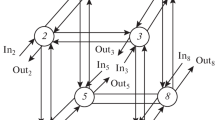Abstract
A number of parallel programming techniques have been used in the construction of parallel linear algebra algorithms at KSLA. These techniques rely on the use of invariants and clustering of invariants in order to obtain a parallel program consisting of p processes with even work load distribution and low communication overhead. Absence of deadlock in communication processes is proved by using program text transformations.
Chapter PDF
Similar content being viewed by others
Keywords
These keywords were added by machine and not by the authors. This process is experimental and the keywords may be updated as the learning algorithm improves.
References
E.W.D. Dijkstra, “A Discipline of Programming,” Prentice-Hall, 1976.
D. Gries, “The Science of Programming,” Springer-Verlag New York Inc., 1981.
C.A.R. Hoare, “Communicating Sequential Processes,” Prentice-Hall International, UK, Ltd., London, 1985.
Inmos Ltd., “The occam programming manual,” Prentice-Hall, 1984.
S.L. Johnsson, “Communication Efficient Basic Linear Algebra Computations on Hypercube Architectures,” J. Sci. Statist. Comput. 4 (1987).
S. Owicki, D. Gries, “An axiomatic proof technique for parallel programs I,” Acta Informatica 6 (1976).
M. Rem, “Small Programming Exercises 18, 19 and 20,” Science of Computer Programming 7, 8 and 9 (1986).
A.W. Roscoe, C.A.R. Hoare, “The laws of occam programming,” PRG-53, Oxford University Computing Laboratory.
J.L.A. van de Snepscheut, “A derivation of a distributed implementation of Warshall's algorithm,” Science of Computer Programming 7 (1986).
J.G.G. van de Vorst, “The internal structure of a parallel Linear Algebra library,” Submitted to Distributed Computing.
Author information
Authors and Affiliations
Editor information
Rights and permissions
Copyright information
© 1989 Springer-Verlag Berlin Heidelberg
About this paper
Cite this paper
Loyens, L.D.J.C. (1989). Parallel programming techniques for linear algebra. In: van Zee, G.A., van de Vorst, J.G.G. (eds) Parallel Computing 1988. Shell 1988. Lecture Notes in Computer Science, vol 384. Springer, Berlin, Heidelberg. https://doi.org/10.1007/3-540-51604-2_3
Download citation
DOI: https://doi.org/10.1007/3-540-51604-2_3
Published:
Publisher Name: Springer, Berlin, Heidelberg
Print ISBN: 978-3-540-51604-0
Online ISBN: 978-3-540-46689-5
eBook Packages: Springer Book Archive




